Understanding the BCMAs Equity Initiatives: An Overview
In recent feedback opportunities, BCMA members have expressed confusion and feelings of exclusion from various equity initiatives the BCMA offers. This post is meant to help members understand the motives behind these initiatives and to promote an understanding of the needs these programs meet.
If you haven’t seen our regular updates: the BCMA has published regular justice, equity, diversity, and inclusion updates since 2020. To read our past updates, please visit this page.
Jump to:
BCMA Values Sector Changes IBPOC Network, 2SLGBTQIA+ Network, Joint Networks Events, Indigenous Advisory Committee, Learning Resources
Leading with the BCMA Values
Within the recent BCMA Strategic Plan 2024-2029, staff and council have committed themselves to advancing justice, equity, diversity and inclusion and placing these values at the core of our programs, policies and decisions. BCMA promised to promote equitable representation by actively working towards increasing the presence of historically underrepresented individuals (including but not limited to people with disabilities, IBPOC cultural professionals, and 2SLGBTQIA+ individuals) in the BCMA and the sector while providing dedicated support and resources for marginalized arts, culture, and heritage professionals and volunteers.
Accountability: Accepting responsibility with integrity, transparency, and openness.
We hold ourselves accountable to the highest standards, fostering integrity, honesty, and openness as we learn from our past, embrace transparency, and fulfill our responsibilities.
Bravery: Using position, voice, and privilege to support a more just future.
We demonstrate bravery through fearless advocacy for the cultural sector, challenging the status quo, advancing reconciliation, and upholding the highest ethical standards.
Equity: Listening to underrepresented voices and supporting social justice.
We advance equity by actively challenging norms, prioritizing diverse needs, listening to underrepresented voices, and fearlessly embarking on a collaborative journey guided by justice, diversity, and inclusion.
Innovation: Redefining what is possible to spark transformative change.
We embrace innovation by collaborating with emerging leaders, adopting sustainable practices, and pushing boundaries within the cultural sector. We re-imagine, create, lead, and champion non-traditional programming to spark transformative change.
Relevance: Demonstrating leadership within our community and the global cultural sector.
We strive for relevance by proactively engaging with communities, continuously adapting to their changing needs, and uplifting organizations that strive for progress, equity, and meaningful societal impact.
Respect: Cultivating humility, listening deeply, honouring diverse voices.
We practice respect by humbly listening, adapting, and prioritizing relationships, creating safer spaces that amplify diverse voices, championing decolonial practices, and cultivating a culture of empathy and critical reflection.
Advancing With Sector Partners
Organisations throughout the arts, culture and heritage sector are moving to prioritize equity initiatives and programs, including through partnership initiatives like the Pathways Program, representing a sector-wide collaboration between the BC Arts Council, Arts BC, BCMA, Greater Vancouver Professional Theatre Alliance, and the Rural Arts Inclusion Lab (RAIL). Many individual organisations in the sector are focused on centring equity and reconciliation at the core of their missions, visions, and mandates, including through their strategic plans, like Heritage BC and the Museum of Vancouver. Major funding bodies regulated by the provincial and federal government include priorities of reconciliation, equity, inclusion and access like BC Arts Council’s current priorities, and Canadian Heritage’s goals of achieving inclusive diversity in their operations framework.
The BCMA recognizes that people and communities have experienced different circumstances in the creation and continuation of the sector, and therefore, equal opportunities in the sector are not equitable opportunities in the sector. IBPOC and 2SLGBTQIA+ communities have historically been marginalized, refused access, and generally ignored; within the collections, within the representation in exhibitions, and at all levels of employment in our organisations.
EQUALITY means each individual or group of people is given the same resources or opportunities. EQUITY recognizes that each person has different circumstances and allocates the exact resources and opportunities needed to reach an equal outcome.
Learn More Online at George Washington University
The sector remains primarily made up of a workforce identified as white, male and cisgender, which struggles to represent the diverse communities we serve as we work to engage, reinterpret, and decolonize our spaces and activities. Our aim with equity initiatives at the BCMA is to uplift and create necessary additional support for these communities to meet their unique needs and to help offset the circumstances that have kept them on the outskirts.
The BCMA believes that a more diverse sector is a sector that will thrive. By supporting equity-deserving communities through initiatives specifically designed for them, we are encouraging employment retention and creating spaces that are healthy and welcoming to work in.
“The ‘reverse racism’ card is often pulled by white people when people of color call out racism and discrimination, or create spaces for themselves … that white people aren’t a part of. The impulse behind the reverse racism argument seems to be a desire to prove that people of color don’t have it that bad, they’re not the only ones that are put at a disadvantage or targeted because of their race.” (Blay, 2015) The systemic power dynamics created and supported by the Eurocentric worldview that our society and sector are based on do not work in the opposite direction because equity-deserving groups do not hold the systemic power.
Learn more at Alberta Civil Liberties Research Centre
IBPOC Cultural Professionals Network
Created in 2020, the IBPOC Network provides support for IBPOC (Indigenous, Black, People of Colour) students, volunteers, and professionals through workshops, webinars, networking, and resource development.
Why is this needed? Folks who identify as Indigenous, Black, a Person of Colour, or racialized are currently underrepresented in this sector, comprising only 23% of the workforce in galleries, archives, and cultural institutions (2021 Census). IBPOC workers are often the only people of racialized backgrounds on their team, and as organisations work towards accomplishing equity and inclusion goals, the majority of this labour tends to fall on IBPOC team members (whether this is intended or not). Some of this labour may be unpaid, as it often relies upon relationship-building and processing of emotional needs and experiences that take place away from a desk setting.
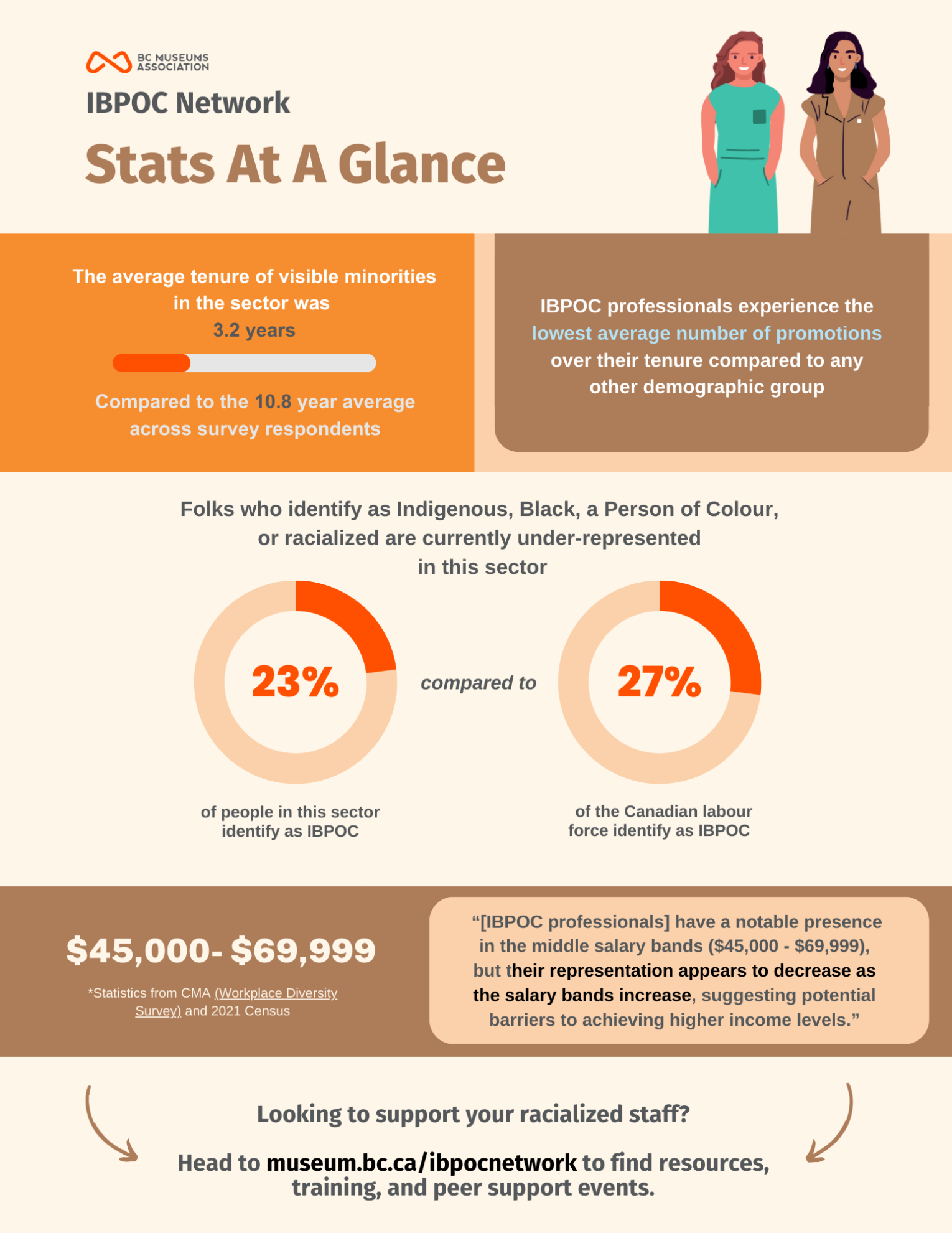
The affinity spaces created by the IBPOC Network are designed to be accountable places where participants can share openly about the challenges they face in the sector. The goal of these sessions is to create a wide-ranging peer support network between IBPOC professionals across the province that ultimately strengthens their representation in this sector and meets their diverse needs. In the case of the workshops, there is an additional goal of building specific skill sets to help IBPOC professionals navigate challenges in the workplace that pertain to their racialized positionalities and achieve career longevity and stability.
These spaces benefit both employers and employees, as participation in our workshops and sessions leads to higher employee retention and workplace well-being. They also help organisations meet any equity and inclusion commitments made. To learn more about the supports offered by the IBPOC Network and how they benefit us all, please watch this presentation.
“An affinity group is a community of peers that offers support, guidance, resources, and mentorship to its members, who identify as like-minded with the group. Affinity groups are particularly valuable as they provide a sense of belonging, community, and collective empowerment to members of historically, systemically, and perpetually marginalized groups, whose experiences and voices are often not centered.” – UBC
2SLGBTQIA+ Network
Building on the success of the BCMA’s Gender & Sexuality Inclusion Toolkit and responding to community needs, the 2SLGBTQIA+ Network was launched in 2023 to provide a safer, accountable space where 2SLGBTQIA+ students, volunteers, and professionals in the arts and culture sector can connect.
Why is this needed? While Canada is home to approximately one million 2SLGBTQIA+ community members, there has been only a slight increase in diverse narratives represented in museum and cultural sectors. In a 2021 BCMA Survey, about half of respondents did not think that diverse gender and sexual diversity are currently well-represented in the content of cultural institutions (55.55%), and many were neutral. Survey results also revealed that queer and trans staff members were often disappointed and hurt by museum content. Those same staff members found that 2SLGBTQIA+ content in their institutions’ exhibitions often felt tokenizing and for allyship optics.
Accountable Space: Accountability means being responsible for yourself, your intentions, words, and actions. It means entering a space with good intentions, but understanding that aligning your intent with action is the true test of commitment.
When we centre accountability we put the onus on all participants to practice and build the skills necessary to experience productive discomfort, to improve methods of self-regulation and to contribute to constructive forms of friction and conflict. These skills are facilitated by clear and transparent expectations, community agreements and transformative practices for identifying and addressing harm. – York University
Additionally, recent data from Hill Strategies confirms that transgender and non-binary people gravitate towards the arts (artists represent 7% of all transgender and non-binary people in the Canadian labour force) but have lower personal incomes than cisgender women, and especially cisgender men. Even in arts leadership positions, we see 2SLGBTQIA+ community members having a much smaller personal income with the 380 non-binary art leaders having a median income 42% lower than cisgender men and the 130 transgender arts leaders having a medium income 54% lower than cisgender men.
Supporting the careers of 2SLGBTQIA+ artists and cultural workers is key to moving towards a more equitable sector. The Network provides specifically targeted programming for the unique challenges queer professionals face in the sector and offers some resources for allies who would like to improve their individual and organisational practices.
Some 2SLGBTQIA+ Network events will be open for anyone to attend, and some will be affinity spaces specifically for self-identified 2SLGBTQIA+ individuals. If an event is specified as an affinity space, we kindly ask that allies step out.
Joint Networks Events
Some of our attendees have felt that they need to choose parts of their identities to attend our IBPOC Network or 2SLGBTQIA+ Network events. While both our networks try to cultivate spaces that are welcoming, it’s not necessarily immediately apparent that these affinity spaces will be safe for multiple marginalized people. Collaborating on shared Network programming is not only a way to build intersectional spaces, but to build solidarity networks and strengthen our communities.
Indigenous Advisory Committee
The BCMA established the Indigenous Advisory Committee (IAC) in 2017 with the goals of building stronger relationships and partnerships between the museum sector and Indigenous communities, as well as working to decolonize museum practices. The Committee’s formation was directly tied to the Rod Naknakim Declaration and aims to build on the values expressed within it.
The IAC meets with BCMA staff to provide direction, advise, brainstorm and connect to move the sector forward on these initiatives. A member of the BCMA Council sits on the IAC to ensure that communication between the two is clear. The IAC was the driving force behind the Repatriation Call to Action and was instrumental in the administration of the 2020 Repatriation Grants. The IAC helps the BCMA staff to ensure the inclusion of Indigenous direction in the BCMA by participating in various strategic and funding plans.
Why is this needed? The Indigenous Advisory Committee exists because the BCMA needs the guidance of an all-Indigenous group of passionate advocates who have the networks and experience to help guide reform in the sector. The IAC is separate from our BCMA Council and offers guidance for programs, strategic planning and other operations. Having the Indigenous Advisory Committee is integral to the BCMA’s ability to develop and offer responsive programs that address challenges Indigenous organizations, communities and staff face while they engage in dialogue, repatriation and projects with the arts, culture and heritage sector. The programs the BCMA develops from conversations with the IAC seek to offer support to Indigenous groups while also creating and supporting increased allyship in the sector.
The inequity that exists in our sector runs deep into all aspects of programs, policies, and how we engage with communities. While many believe that racism within the workplace is no longer an issue, events like the RBCM investigation into racism after Sdaahl K’awas Lucy Bell resigned from her position are still happening across the sector without media attention. The need for cultural sensitivity, empathy and understanding of the issues faced by Indigenous people working in or accessing museums is essential to creating better relationships and reducing harm. Reconciliation is everyone’s work at the BCMA and within the sector.
Cultural Sensitivity: awareness and appreciation of the values, norms, and beliefs characteristic of a cultural, ethnic, racial, or other group that is not one’s own, accompanied by a willingness to adapt one’s behavior accordingly.
Learn more from the American Psychological Association
Further Your Education
Want to learn more about how to cultivate inclusion and equity in your work or leadership? Find a wide range of tools and resources below to get you started
Have questions about your Human Rights?
The BC Human Rights Code (the Code) protects people in BC from discrimination. The Code prohibits discrimination based on certain personal characteristics and in certain protected areas. The BC Human Rights Clinic operates a telephone Inquiry Line which provides general information to complainants about the BC Human Rights Code and Tribunal process. They do not offer legal advice through this service. For legal advice, please visit the Short Service Clinic: bchrc.net/services/short-service-clinic/
The Inquiry Line is open 5 days a week, Monday to Friday, from 8:30 am to 4:00 pm.
Phone: 604-622-1100
Toll free: 1-855-685-6222
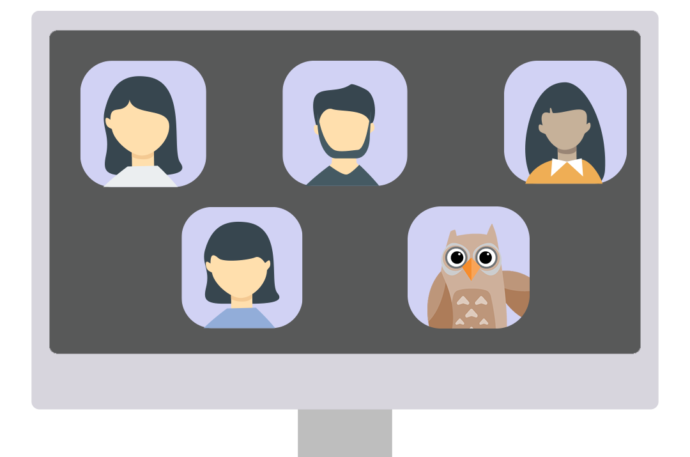
BCMA Webinar: Challenging Inequities Through Inclusive Leadership
In this session, facilitator Madison Tardif provides tools and resources to think about what skills make an inclusive leader.
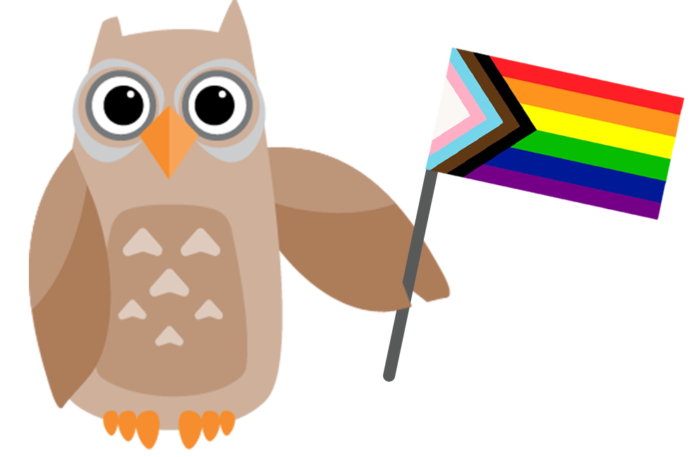
Gender and Sexuality Inclusion Toolkit for Museums, Heritage and Cultural Institutions
Museums and cultural institutions tell the stories and preserve the histories of an area, aiming to be representative of the local region and foster a strong sense of community. How does gender and sexual orientation inclusion align with these goals?
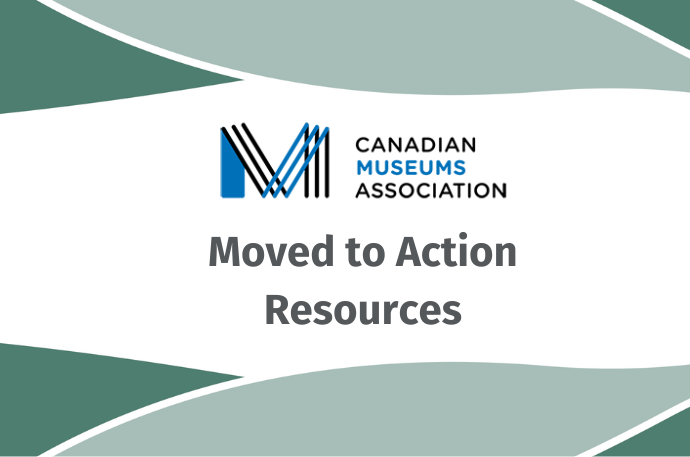
Moved to Action Resources
As part of this report, the CMA has created and identified helpful resources to support museums in their decolonizing efforts.

Webinar: Introduction to Brave Spaces
A look at creating brave spaces and practical tools you can bring into your own institution.
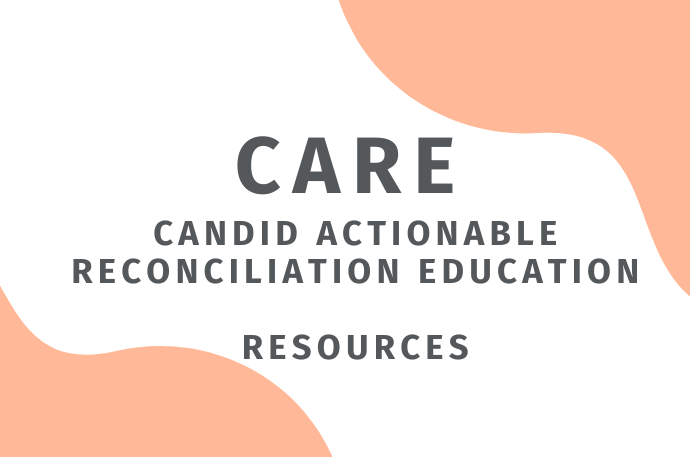
Candid Actionable Reconciliation Education (CARE) for Museums
A collection of resources that aim to connect museums with the knowledge and ideas they need to make meaningful steps towards reconciliation and decolonization while being mindful of the time and capacity of Indigenous communities and knowledge holders.

